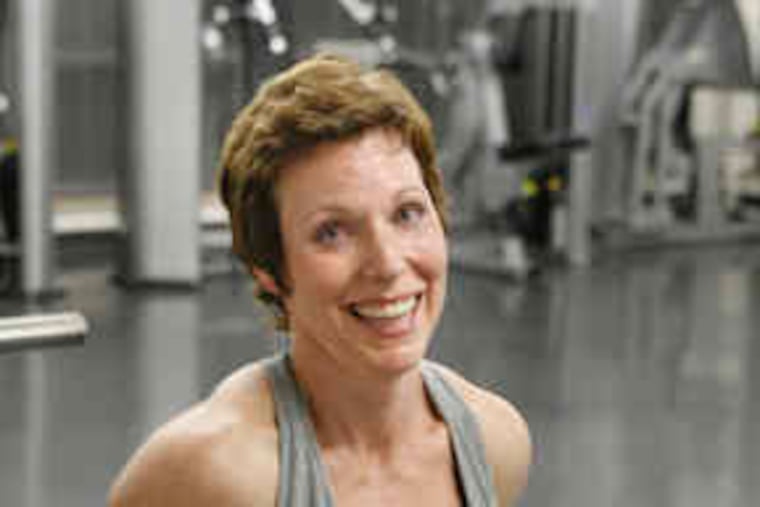
As a professor of health and exercise science, Leslie Spencer practiced what she preached. She watched her diet. She ran and lifted weights and kettlebells.
As she neared her mid-40s, she entered a phase of midlife reckoning. Her life felt heavy with responsibility, and she missed the excitement and spontaneity of youth.
Two of her students at Rowan University were helping her train with weights, and she began flirting with the idea of bodybuilding, of displaying her increasingly toned figure in a contest.
"I like the idea of building muscle and having a strong physique but I want to be feminine, pretty, and natural," Spencer says.
"It appealed to me because it seemed fun and edgy. I mean, a 45-year-old college professor, mother, and pastor's wife is really going to get the spray tan, the fake eyelashes, the glittery bikini, and the 4-inch platform heels and walk on stage?"
She knew she had advantages. She was tall, well-proportioned, and her legs, honestly, were sensational. What she lacked, she joked with her trainers, was breast implants, seemingly de rigueur among successful figure contestants.
Spencer has them now. And not by choice.
In March 2009, her yearly mammogram revealed spots in her left breast. A biopsy showed she had cancer, aggressive and swift. Her oncologist recommended an immediate double mastectomy, chemotherapy, and radiation.
Spencer was shocked. She lived so cleanly, had no family history of the disease. But she didn't cry, deny, or go into a tailspin.
"I viewed it as a project and began plotting the work I had to do," Spencer says. "I never struggled with 'Why me?' This happens to lots of people every day, so why not me? Every life gets a little bit of rain, and here comes my storm."
In April of that year, both breasts were removed, and shortly thereafter, a plastic surgeon began reconstructing her ravaged chest. But there was more bad news: A biopsy of the excised tissue of her right breast revealed cancer of another sort, equally lethal. In May, she underwent surgery yet again to remove more lymph nodes on her left side as well as the lymph nodes on her right side.
Over that summer, she began chemotherapy and radiation. Each time the chemo laid her low, she fought her way back, diligently managing the side effects to salvage a sense of control. Throughout, she continued to exercise. She insisted on getting out of bed, stretching and moving and using her body. She would walk, first around the house, then around her Morrisville neighborhood.
She was inspired by the studies of University of Pennsylvania researcher Kathryn Schmitz showing that breast cancer survivors benefit from weight training. She was careful not to do too much too soon, but she was also determined. By the end of each six-week chemo cycle, she was running three miles and lifting weights for 45 minutes. Then she'd begin another course of chemo and push the boulder up the mountain again. Meanwhile, she was receiving injections of a saline solution to expand her pectoral muscles for the insertion of implants.
All along, she was sustained by a dream. On the Internet, she shopped for posing bikinis, fantasizing about how she'd look on stage. She researched bodybuilding contests, seeking one that would fit her recovery schedule.
Last December, another visit to the operating room; precancerous cells had been spotted in her cervix, and Spencer had a hysterectomy. Now was the time, she decided, to present her gynecologist a bouquet of flowers and a note thanking him for saving her life. She'd be dead by now, she figured, if not for that yearly mammogram.
She was supported as well by Domenick Salvatore, 24, a former student who became her personal trainer, visiting once a week to supervise her workouts. "He affirmed that I was a healthy person," Spencer says, "since people dying from cancer don't have personal trainers." She continued to pump iron, wearing compression sleeves on her arms to control the swelling of lymphedema.
On a Saturday in late August, Spencer was excited and nervous. It was her first bodybuilding event, a regional contest under the auspices of the Organization of Competitive Bodybuilders in Burlington. Spencer signed up to compete in two figure classes: one for those making their debuts, the other for women over 45.
"It was very much an athletic competition," Spencer says, "not some bimbo-ey thing about who looks hot in a bikini. It's difficult to hold the poses, and your body really becomes a symbol of all your hard work in the gym."
Spencer did not place. She did not win a trophy.
"My victory was that I did it," she says. "I felt like a winner just stepping onto the stage.
"After losing my breasts and uterus, all the organs that define me as female, to be able to compete in something that is very much a celebration of femininity, there was something reassuring about that that I wouldn't have gotten if I'd done a triathlon."